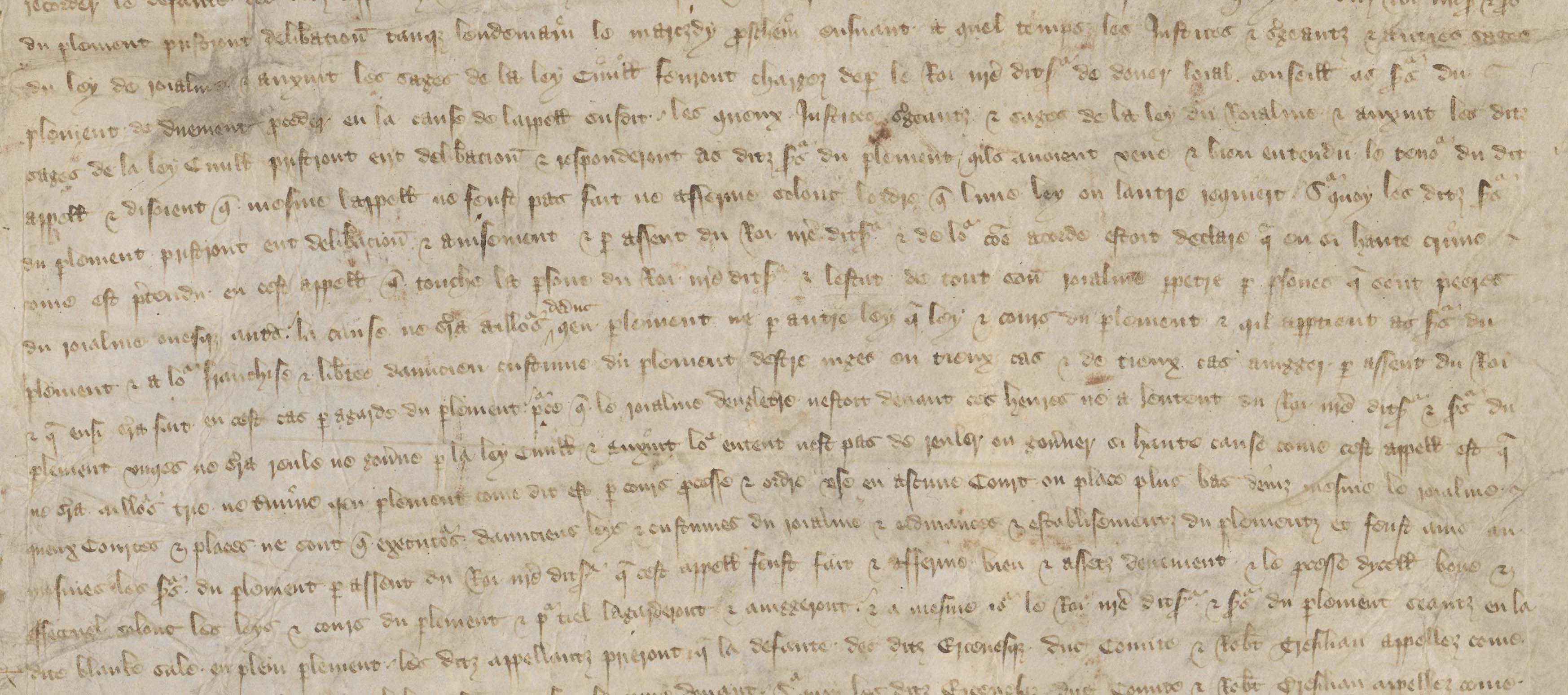
The importance and ‘legal supremacy’ of Parliament, February 1388 (C 65/48, article 14)
The Lords’ Appellant used Parliament as a weapon against their enemies, and brought the ‘traitors’ to trial before Parliament. They took care to justify the legality of their use of Parliament as a court of law by asserting that it was the only venue suitable to judge the ‘high crimes’ committed by their enemies.
Transcript
Upon which day [4 February 1388] the justices and serjeants and other learned men of law of the kingdom, and also men learned in civil law, were charged on behalf of the king our said lord to give faithful counsel to the lords of parliament duly to proceed in the cause of the aforesaid appeal. Which justices, serjeants, and learned men in the law of the kingdom, and also the said men learned in civil law, considered the matter and informed the said lords of parliament that they had seen and well understood the tenor of the said appeal, and they said that the same appeal had not been made or affirmed in accordance with the procedure required by either law. Whereupon the said lords of parliament held discussion and counsel thereon, and with the assent of our said lord the king and the common assent it was declared that in the case of so high a crime as that alleged in this appeal, which touched the person of our said lord the king and the estate of all his kingdom, perpetrated by persons who are peers of the realm and others, the case should be conducted nowhere other than in parliament, nor by any other law than the law and usage of parliament, and that it pertained to the lords of parliament and to their franchise and liberty of the ancient custom of parliament to be judges in such a case, and to adjudge such a case with the assent of the king. And that so it will be done in this instance by decision of parliament, because the kingdom of England was never in the past, nor by the will of the king our said lord and the lords of parliament ever would be, ruled or governed by the civil law: and also it is their intention not to rule or govern so high a case as this appeal, which will neither be tried nor determined elsewhere than in parliament, as was said, by the course, process, and procedure practised in any lower court or place within the same kingdom; which courts and places are not executors of the ancient laws and customs of the kingdom and the ordinances and decrees of parliament. And the same lords of parliament were advised, by the assent of the king our said lord, that this appeal should be made and affirmed well and duly, and the process of the same would be good and effectual according to the laws and course of parliament, and thus they should decide and adjudge it.
Simplified Transcript
On the 4 February 1388, the justices (judges) and legal experts of the kingdom, and also men learned in civil law, were asked on behalf of the king to give faithful counsel to the lords of parliament to proceed with their appeal.
The justices and legal experts considered the matter, and informed parliament that they had understood the reasons for the appeal. They stated that the appeal had not been made according to either law (common law or civil law – the two main branches of the judicial system).
The lords of parliament held discussion and counsel about this, and with the agreement of the king and the commons in parliament, it was declared that in the case of so high a crime as that alleged in this appeal, which related to the person of the king and the estate of all his kingdom, the case should be conducted nowhere other than in parliament, nor by any other law (common law or civil law) than the law and usage of parliament.
It pertains to the lords of parliament and to their franchise (legal rights) and liberty of the ancient custom of parliament to be judges in such a case, and to adjudge such a case with the agreement of the king.
It is their intention not to judge so high a case, which will neither be tried nor determined elsewhere than in parliament, by the procedures practised in any lower court within the same kingdom.
And the same lords of parliament were advised, by the agreement of the king, that this appeal should be made according to the laws and course of parliament, and thus they should decide and adjudge it.
